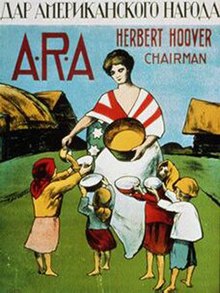Foreign policy of Herbert Hoover covers the international activities and policies of Herbert Hoover for his entire career, with emphasis to his roles from 1914 to 1933.

Hoover had many interests around the world:
- Belgian relief in 1914-1917. He worked with Berlin and London to allow shipments of food to Belgium.
- Food: When the US entered the war in 1917 Hoover left London and headed the new U.S. Food Administration, coordinating food supplies and relief efforts to the Allies
- Russia: During the postwar Russian Revolution, Hoover played a key role in providing humanitarian relief to famine-stricken areas of Russia.
- Disarmament: Hoover was an advocate for arms reduction and international disarmament as a means to maintain peace and prevent future conflicts.
- Latin America: Hoover sought to improve relations with Latin American countries, emphasizing economic cooperation, investment, and non-intervention in their affairs. As President, Hoover began what President Roosevelt continued as "the Good Neighbor Policy," which aimed to strengthen ties and mutual respect.
- Tariffs and Protectionism: Hoover implemented protectionist policies, including signing the Smoot-Hawley Tariff Act in 1930, which raised tariffs on imported goods. This move aimed to protect American industry but other countries retaliated and US exports plunged.
- Non-interventionism: Hoover strongly favored a non-interventionist approach to foreign wars. He campaigned to keep the United States out of direct military involvement in World War II during 1939-1941.